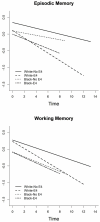Apolipoprotein E and change in episodic memory in blacks and whites
- PMID: 23364031
- PMCID: PMC3645297
- DOI: 10.1159/000342778
Apolipoprotein E and change in episodic memory in blacks and whites
Abstract
Background: Apolipoprotein E (APOE) ε4 is related to faster decline in episodic memory in Whites, but the relation is unknown in Blacks. The purpose of this study was to determine whether ε4 has a selective effect on decline in episodic memory in Blacks.
Methods: Data are from two cohort studies with similar design. The sample consisted of 1,211 participants [28.4% Blacks, mean age = 78.6 years (SD = 7.4), education = 14.7 years (SD = 3.1)] without dementia at baseline, who underwent annual clinical evaluations for up to 6 years. Summary measures of 5 cognitive abilities were derived from 18 neuropsychological tests.
Results: In mixed models that controlled for age, sex, education, and race, possession of ε4 (present in 32.9% of Blacks and 21.0% of Whites, p < 0.001) was related to faster decline in episodic memory and 4 other cognitive abilities (all p values <0.01). In separate models that examined the interaction of race and ε4 on decline, there was no significant difference between Blacks and Whites in the effect of ε4 on decline in episodic memory, perceptual speed, or visuospatial ability. By contrast, the effect of ε4 differed for semantic memory and working memory. Results were similar after adjusting for vascular conditions.
Conclusions: The results suggest that APOE ε4 is related to a faster rate of decline in episodic memory in Blacks similar to Whites. In addition, there were racial differences in the effect of ε4 in other cognitive abilities such that the ε4 allele was related to faster decline in semantic memory and working memory for Whites but not for Blacks.
Figures


References
-
- Tzourio C, Arima H, Harrap S, Anderson C, Godin O, Woodward M, et al. APOE genotype, ethnicity, and the risk of cerebral hemorrhage. Neurology. 2008;70:1322–28. - PubMed
-
- Winkler K, Hoffmann MM, Krane V, Marz W, Drechsler C, Wanner C. Apolipoprotein E genotype predicts cardiovascular endpoints in dialysis patients with type 2 diabetes mellitus. Atherosclerosis. 2010;208:197–202. - PubMed
-
- Corder EH, Saunders AM, Strittmatter WJ, Schmechel DE, Gaskell PC, Small GW, et al. Gene dose of apolipoprotein E type 4 allele and the risk of Alzheimer’s disease in late onset families. Science. 1993;261:921–23. - PubMed
-
- Wisdom NM, Callahan JL, Hawkins KA. The effects of apolipoprotein E on non-impaired cognitive functioning: a meta-analysis. Neurobiol Aging. 2011;32:63–74. - PubMed
-
- Farrer LA, Cupples LA, Haines JL, Hyman B, Kukull WA, Mayeux R, et al. Effects of age, sex, and ethnicity on the association between apolipoprotein E genotype and Alzheimer disease. A meta-analysis. APOE and Alzheimer Disease Meta Analysis Consortium. JAMA. 1997;278:1349–56. - PubMed
Publication types
MeSH terms
Substances
Grants and funding
LinkOut - more resources
Full Text Sources
Other Literature Sources
Medical
Miscellaneous

